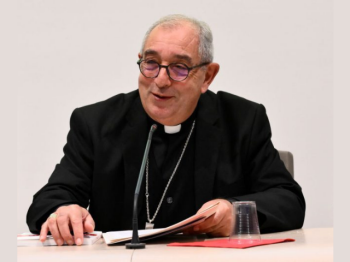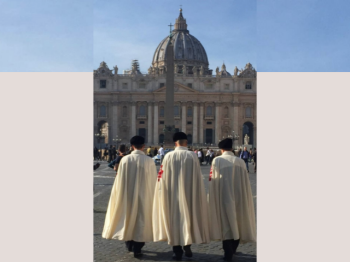How to experience the liberating joy of a Jubilee Indulgence?
 The Major Penitentiary of the Catholic Church encourages us to rediscover the virtue of hope during the Holy Year 2025, notwithstanding the current global circumstances.
The Major Penitentiary of the Catholic Church encourages us to rediscover the virtue of hope during the Holy Year 2025, notwithstanding the current global circumstances.
The Order's international Jubilee pilgrimage will bring together 3,000 Knights and Dames, pre-registered*, in Rome from October 21 to 23, 2025, with a scheduled crossing of the Holy Door at the four Papal Basilicas and an audience with the Holy Father. As part of the preparation for this spiritual event, Cardinal Angelo De Donatis, Member of the Order of the Holy Sepulchre and Major Penitentiary of the Catholic Church, explains what the ‘indulgence’ associated with this 2025 Jubilee centred on the theme of hope represents.
Your Eminence, what is the Apostolic Penitentiary’s mission, of which you are responsible on behalf of the Pope?
The Apostolic Penitentiary is the body of the Roman Curia that is responsible for administering God’s mercy on behalf of and in the name of the Holy Father.
Legally, it is configured like a tribunal; however, it is a very special one. Here, no one is convicted, for the only sentence that can be issued is forgiveness, dispensation, or grace. Furthermore, it has another unique characteristic: its jurisdiction extends exclusively to the internal forum, which pertains to the intimate sphere of the relationship between the faithful and God. In this realm, the Church’s mediation does not aim to regulate the social consequences of such relationships but rather to ensure the good of the faithful and the restoration of their state of grace. For this reason, those who turn to the Penitentiary usually do so through their confessor, and everything is protected by absolute and inviolable confidentiality.
Specifically, the Penitentiary is responsible for: the granting of absolution from reserved censures; dispensation from irregularities in receiving or exercising Holy Orders; the grace of the root cure of an invalidly contracted marriage; and, the reduction of obligations for unfulfilled Mass intentions. More generally, the Penitentiary examines and resolves all moral doubts and cases of conscience submitted to it. The Apostolic Penitentiary is also tasked with overseeing the clergy who serve as confessors in the Papal Basilicas of Rome, known as Minor Penitentiaries.
Finally, the Penitentiary is entrusted with all matters concerning the granting and use of indulgences.




